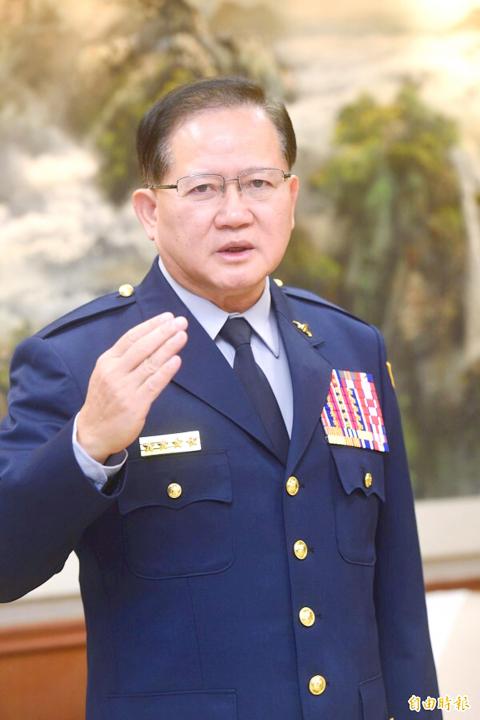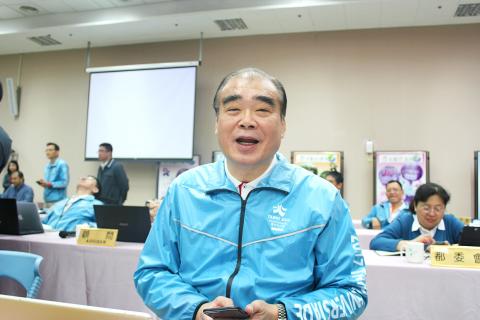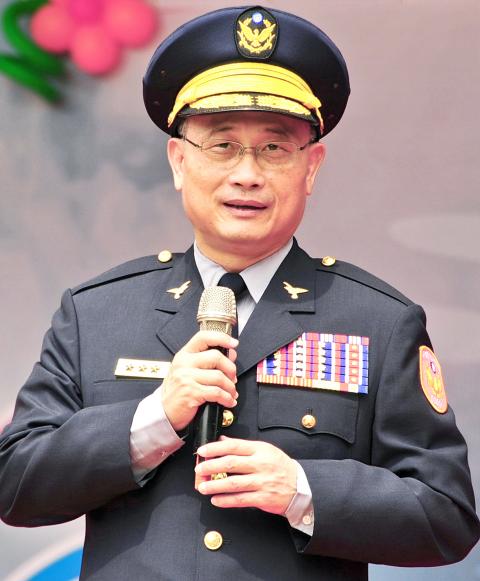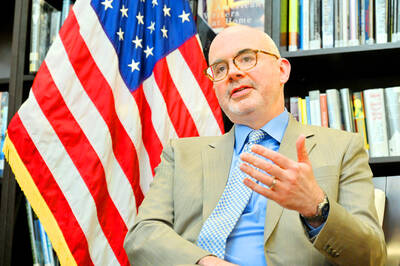A major reshuffle of high-ranking police officials on Tuesday took many by surprise, with several legislators saying it was a slap in the face for Taipei Mayor Ko Wen-je (柯文哲).
The Ministry of the Interior announced the reshuffle on Tuesday night, promoting Kaohsiung Police Department Commissioner Chen Chia-chin (陳家欽) to head the National Police Agency (NPA), while Taipei Police Department Commissioner Chiu Feng-kuang (邱豐光) was appointed his deputy.
NPA Director-General Chen Kuo-en (陳國恩) is to become deputy chief of the National Security Bureau.

Photo: Chung Chih-kai, Taipei Times
Taiwan Police College President Ho Ming-chou (何明洲) is to replace Chen Chia-chin as Kaohsiung police chief, while NPA Deputy Director-General Wei Ti-kun (衛悌琨) is to become the college’s new president.
Taichung Police Department Commissioner Chen Jia-chang (陳嘉昌) is to fill the vacancy left by Chiu, while NPA Chief Secretary Yang Yuan-ming (楊源明) is to become the new Taichung police chief.
The handover ceremonies are scheduled to take place today and tomorrow, the ministry said.

Photo: Shen Pei-yao, Taipei Times
Speculation had been rife that Chiu would be replaced as Taipei police chief after security breaches at the Taipei Summer Universiade opening ceremony on Aug. 19 led to protesters breaking police lines and delaying its start.
KMT legislators viewed the reshuffle as further evidence of a falling out between the Democratic Progressive Party (DPP) and Ko, an independent, who joined forces during the last mayoral election.
It is unprecedented for the Kaohsiung police chief to be promoted directly to head the National Police Agency, as they were usually appointed first to Taipei police chief, Chinese Nationalist Party (KMT) caucus deputy secretary-general Tseng Ming-tsung (曾銘宗) said.

Photo: Huang Liang-chieh, Taipei Times
The appointment was politically motivated and a snub by the DPP aimed at Ko, Tseng said.
Kaohsiung Mayor Chen Chu (陳菊) appears to have a great influence on the DPP’s “New Tide” faction and has become the “underground” go-to person for Executive Yuan personnel appointments, KMT Legislator Lee Yen-hsiu (李彥秀) said.
DPP Legislator Hsu Chih-chieh (許智傑) praised the reshuffle, saying Premier William Lai (賴清德) had the courage to “grasp the nettle” of security mismanagement.
Chiu’s transfer was an “obvious demotion” because the NPA deputy directorship is a high-ranking position, but carries little power, Hsu said.
The reshuffle was made to hold officers accountable for the Universiade security breaches, he said.
“The difference between being chief of a local police department and deputy director of the NPA is that in the local [police] department, you are the boss, while at the NPA, you only command a few secretaries,” DPP Legislator Huang We-cher (黃偉哲) said.
People First Party (PFP) Legislator Chen Yi-chieh (陳怡潔) said that the appointment was a sign that the central government was unhappy with police’s handling of protests nationwide.
The move was also a slight against Ko, she said, adding that the relationship between the DPP and Ko would not only affect local elections next year, but also the 2020 presidential election.
While the Ministry of the Interior had the power to appoint and transfer individuals for the NPA, it usually notifies local heads of government before making a move, New Power Party (NPP) Legislator Freddy Lim (林昶佐) said.
This breach of custom might affect interaction and cooperation between the Taipei Police Department and the Taipei City Government, Lim said, adding that the ministry should offer an explanation.
The reshuffle was in part due to the security breaches at the Universiade, which caused a delay in athletes entering the Taipei Municipal Stadium to participate in the opening ceremony, Minister of the Interior Yeh Jiunn-rong (葉俊榮) said on Tuesday.
The incident highlighted weaknesses in national security measures and measures to manage protests in Taipei, Yeh said.
That is why Chen Jia-chang, an expert in protest management and psychology, was chosen to head the Taipei Police Department, he said.
Despite relative stability over the past year, law and order work faces three immediate challenges: the threat of terrorist attacks, Internet fraud and drug-related crime, he added.

NATIONAL SECURITY: The Chinese influencer shared multiple videos on social media in which she claimed Taiwan is a part of China and supported its annexation Freedom of speech does not allow comments by Chinese residents in Taiwan that compromise national security or social stability, the nation’s top officials said yesterday, after the National Immigration Agency (NIA) revoked the residency permit of a Chinese influencer who published videos advocating China annexing Taiwan by force. Taiwan welcomes all foreigners to settle here and make families so long as they “love the land and people of Taiwan,” Premier Cho Jung-tai (卓榮泰) told lawmakers during a plenary session at the Legislative Yuan in Taipei. The public power of the government must be asserted when necessary and the Ministry of

CROSSED A LINE: While entertainers working in China have made pro-China statements before, this time it seriously affected the nation’s security and interests, a source said The Mainland Affairs Council (MAC) late on Saturday night condemned the comments of Taiwanese entertainers who reposted Chinese statements denigrating Taiwan’s sovereignty. The nation’s cross-strait affairs authority issued the statement after several Taiwanese entertainers, including Patty Hou (侯佩岑), Ouyang Nana (歐陽娜娜) and Michelle Chen (陳妍希), on Friday and Saturday shared on their respective Sina Weibo (微博) accounts a post by state broadcaster China Central Television. The post showed an image of a map of Taiwan along with the five stars of the Chinese flag, and the message: “Taiwan is never a country. It never was and never will be.” The post followed remarks

Proposed amendments would forbid the use of all personal electronic devices during school hours in high schools and below, starting from the next school year in August, the Ministry of Education said on Monday. The Regulations on the Use of Mobile Devices at Educational Facilities up to High Schools (高級中等以下學校校園行動載具使用原則) state that mobile devices — defined as mobile phones, laptops, tablets, smartwatches or other wearables — should be turned off at school. The changes would stipulate that use of such devices during class is forbidden, and the devices should be handed to a teacher or the school for safekeeping. The amendments also say

CONSISTENT COMMITMENT: The American Institute in Taiwan director said that the US would expand investment and trade relationships to make both nations more prosperous The US would not abandon its commitment to Taiwan, and would make Taiwan safer, stronger and more prosperous, American Institute in Taiwan Director Raymond Greene said. “The US’ commitment to Taiwan has been consistent over many administrations and over many years, and we will not abandon our commitment to Taiwan, including our opposition to any attempt to use force or coercion to change Taiwan’s status,” he said in an exclusive interview with the Liberty Times (the sister newspaper of the Taipei Times) on Friday last week, which was published in the Chinese-language newspaper yesterday. The US would double down on its efforts